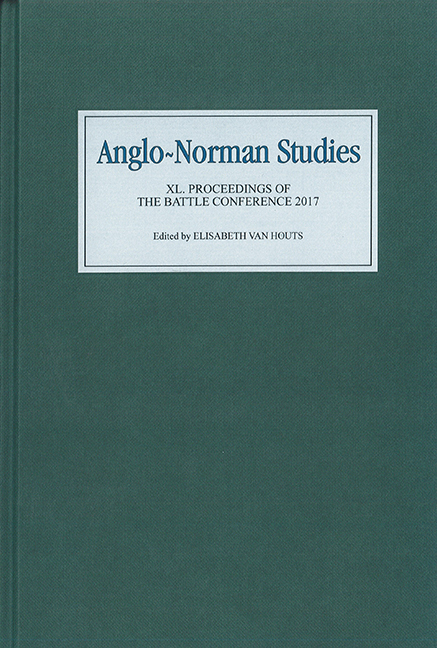Book contents
- Frontmatter
- Contents
- Illustrations and tables
- Editor's preface
- Abbreviations
- The R. Allen Brown Memorial Lecture, 2017
- The R. Allen Brown Memorial Lecture, 2016
- The Marjorie Chibnall Memorial Essay, 2017
- Becket vult: the Appropriation of St Thomas Becket's Image during the Canterbury Dispute, 1184–1200 (The Marjorie Chibnall Memorial Essay)
- La Bataille de Bouvines reconsiderée
- Abbot Peter the Venerable's Two Missions to England (1130 and 1155/1156)
- La production manuscrite anglo-normande et la Bible d'Herman de Valenciennes: usage et réception d'un livre vernaculaire (xii e–xiv e siècles)
- Ralph Niger and the Books of Kings
- From Captivity to Liberation: the Ideology and Practice of Franchise in Crusading France
- Daughter of Fulk, Glory of Brittany’: Countess Ermengarde of Brittany (c.1070–1147)
- The Idea of ‘Empire’ as Hegemonic Power under the Norman and Plantagenet Kings (1066–1204)
- Child Kingship and Notions of (Im)maturity in North-Western Europe, 1050–1262
- Note: A Micro-Economy of Salvation: Further Thoughts on the ‘Annuary’ of Robert of Torigni
Daughter of Fulk, Glory of Brittany’: Countess Ermengarde of Brittany (c.1070–1147)
from The Marjorie Chibnall Memorial Essay, 2017
Published online by Cambridge University Press: 17 July 2018
- Frontmatter
- Contents
- Illustrations and tables
- Editor's preface
- Abbreviations
- The R. Allen Brown Memorial Lecture, 2017
- The R. Allen Brown Memorial Lecture, 2016
- The Marjorie Chibnall Memorial Essay, 2017
- Becket vult: the Appropriation of St Thomas Becket's Image during the Canterbury Dispute, 1184–1200 (The Marjorie Chibnall Memorial Essay)
- La Bataille de Bouvines reconsiderée
- Abbot Peter the Venerable's Two Missions to England (1130 and 1155/1156)
- La production manuscrite anglo-normande et la Bible d'Herman de Valenciennes: usage et réception d'un livre vernaculaire (xii e–xiv e siècles)
- Ralph Niger and the Books of Kings
- From Captivity to Liberation: the Ideology and Practice of Franchise in Crusading France
- Daughter of Fulk, Glory of Brittany’: Countess Ermengarde of Brittany (c.1070–1147)
- The Idea of ‘Empire’ as Hegemonic Power under the Norman and Plantagenet Kings (1066–1204)
- Child Kingship and Notions of (Im)maturity in North-Western Europe, 1050–1262
- Note: A Micro-Economy of Salvation: Further Thoughts on the ‘Annuary’ of Robert of Torigni
Summary
Contemporaries held Countess Ermengarde of Brittany in high regard. Whether in poems or letters, the clergy were full of praise for her. Marbode, bishop of Rennes (1035–1123), stated that ‘Fame reports that no woman surpasses you/ Powerful in eloquence, shrewd in counsel.’ Robert Arbrissel (1045–1116) wrote to her: ‘Do not be too concerned about changing place and habit. Have God in your heart whether you are in the city or in the court, in an ivory bed or in precious clothes, in the army, in judgment, or at a banquet. Love, and God will be with you.’ And Bernard of Clairvaux (1090–1153) addressed her: ‘To his beloved daughter in Christ, Ermengarde, once highest countess, now humble handmaid of Christ. Bernard, abbot of Clairvaux, pious affection of holy love. If only I could open my mind to you just like this letter!’
In spite of the respect shown to Ermengarde by her contemporaries, modern scholarship has all but effaced Ermengarde's activities and, when she is discussed at all, she is often reduced to a handmaiden to Robert of Arbrissel or Bernard of Clairvaux. Indeed, scholars have variously referred to her as a social reject or a woman who could not know her own mind. In contrast to the deafening silence or outright chauvinism, Arlette LeBigre recognized Ermengarde's political acuity and called her ‘the only political male’ to lead twelfth-century Brittany. Although a considerable improvement, this description, too, is problematic as it genders power as male, thus not recognizing that Ermengarde, as a woman, could have power.
Ermengarde was born around 1070, probably in Angers, to Ermengarde of Beaugency and Count Fulk IV le Réchin of Anjou (1043–1109). In 1093, Ermengarde left Anjou to marry Count Alan IV of Brittany (c.1060–1119). Three years later, in 1096, she was left in charge of the county and her two young sons when Alan went on crusade. Upon his return in 1101, the couple ruled Brittany together until 1103×1105 when Ermengarde left to join the community of religious women at Fontevraud. But she returned to Brittany by 1106 and picked up her life as countess. In 1112, Count Alan IV retired to the monastery of Redon and Ermengarde ruled the county with their son Conan III (c.1094–1148), and this she continued to do until her death in 1147.
- Type
- Chapter
- Information
- Anglo-Norman Studies XLProceedings of the battle conference 2017, pp. 165 - 178Publisher: Boydell & BrewerPrint publication year: 2018



